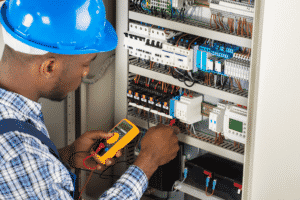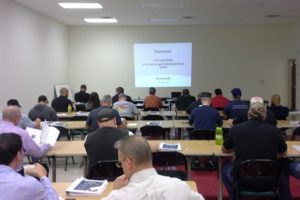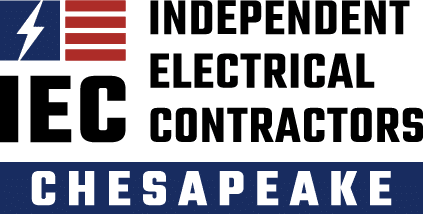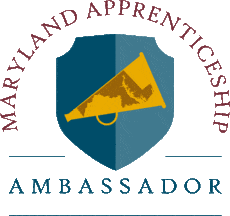The Future Looks Bright
We offer the electrical apprenticeship program in two delivery methods — brick-and-mortar locations and E Apprenticeship.
Employment opportunities are excellent for qualified electricians. According to the U.S. Bureau of Labor Statistics, the job outlook for electricians is expected to grow by an impressive 6% through 2033, higher than the national average for all occupations. 73,500 opening each year for 10 years. Average growth for all occupations is 3%. Electricians also earn high hourly wages, and experienced professionals are always in demand. Those who complete apprenticeship often move quickly up the career ladder and many even operate their own businesses. Are your ready to forge your successful career as an electrician? You’ve come to the right place, because IEC Chesapeake makes it easy with our electrical apprenticeship programs.
Our “earn while you learn” electrical apprenticeship programs give you the competitive edge.
For over 40 years, IEC Chesapeake has been turning out the finest electricians in the workforce. We offer apprenticeships, an “earn while you learn” form of education that combines workplace learning with related technical classroom education. Our electrical apprenticeship programs are taught at a state-of-the-art training facility by committed, knowledgeable instructors using an interactive format that offers opportunities for mentorship as well as learning. Are you unable to attend traditional in-person classes due to your location, work schedule, or other reason? No problem! We also offer the online apprenticeship programs so you can train at your own convenience, from anywhere. In person or online, IEC Chesapeake’s Electrical Apprenticeship programs offer an exciting and unique training experience that build lifelong skills of the trade and give you an advantage in the job market.
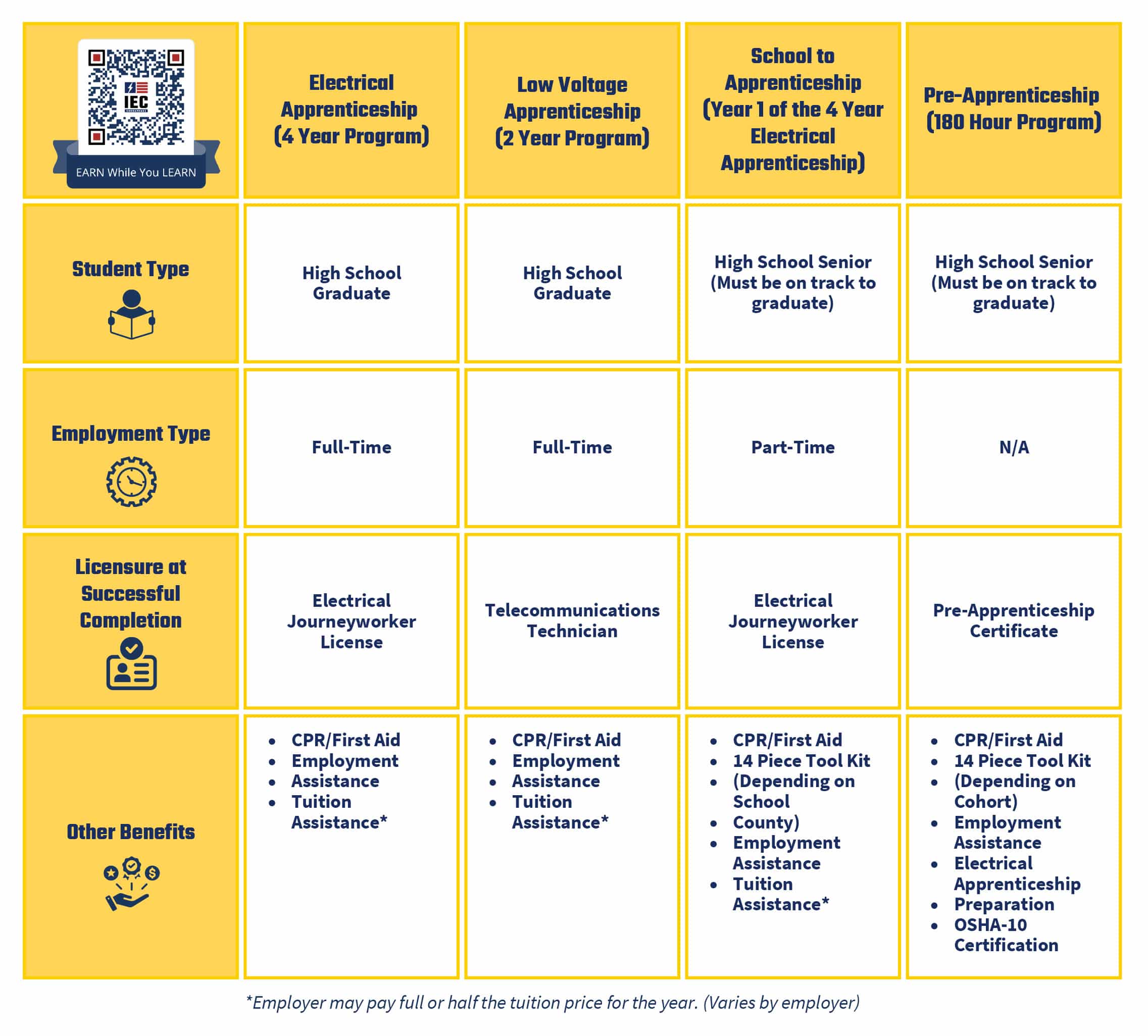
A rewarding new career is at your fingertips. IEC Chesapeake currently offers the following electrical apprenticeship programs:
- Four-Year Electrical Apprenticeship Program
- E Apprenticeship Program
- Electrical Pre-Apprenticeship
- School-to-Apprenticeship (STA)
- Two-Year Telecommunications Technician
Apprenticeship: The Other Four-Year Degree
Did you know that it takes an electrician four years to complete his or her program, the same as a traditional degree? And a Master Electrician trains as long as doctor studies, requiring least eight years on the job and the four years of classroom study. As with many professions, electricians must also be licensed. So, let’s take a look at both options, using University of Maryland data for comparison:
| COST CATEGORIES | TRADITIONAL UNIVERSITY | IEC CHESAPEAKE APPRENTICESHIP PROGRAM |
|---|---|---|
| Annual Tuition & Mandatory Fees* | $11,808 – $41,186 (resident vs. non-resident) | $4,200 |
| On Campus Resident Hall Room, Cable & Phone | $9,562 | N/A |
| Meal Plan (Average) | $6,156 | N/A |
| Books & Supplies** | $1,400 | N/A |
| Local Transportation & Incidental Costs** | $3,000 | N/A |
| TOTAL 4 YEAR COST | $127,704 – $245,216 (resident vs. non-resident) | $16,800 |
The best educational bargain around.
Let’s face it—college is expensive, and it’s not for everyone. At a traditional university, four years of undergraduate study costs Maryland residents more than $100,000. Students may or may not have a job during this time, and even if they do, it’s not likely to be in their field of study. Upon graduation, it often takes a year or more to find suitable employment. The typical graduate also carries massive school loan debt, ranging from $15,000 to as much as $100,000.
There’s a better alternative. In stark contrast, IEC Chesapeake apprentices pay just $16,800 for all four years of school and they work for the duration. In fact, many apprentices are employed by our association member electricians. Some members even offer reimbursement programs based on their performance and grades. As a result, many apprentices’ school expenses are entirely reimbursed! Graduates of the IEC Apprenticeship Program leave school gainfully employed, earning a median annual wage of $61,590 (data as of May 2023), with no school debts to carry. It doesn’t get much better than that!
Easy and free way for apprentices to receive their college credits.
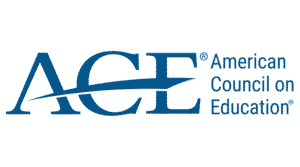
The American Council on Education’s College (ACE) has revised and implemented a new platform and process for IEC apprentices to receive college credit. ACE now makes it even easier for apprentices to receive up to 41 college credit hours for their IEC Training.
Updated program highlights include:
- Eliminated Apprentice/Chapter fees (no longer need to send monies to IEC National)
- Official transcripts are now free for apprentices through the new platform
- Simplified application, now one-page (attached for reference)
- Apprentices now complete the application (with chapter verification) and submit directly to IEC National (reducing chapter administrative work)
- Apprentices can apply for college credits for each year they complete….meaning they don’t have to wait until they graduate to get their credits for the year they just completed
Ready to get started on your lucrative career?
Frequently Asked Questions*
Below you will find answers to the most commonly asked questions concerning our Apprenticeship Program. If you’re unable to find the answer to your question here, please contact us or call (301) 621-9545.
Apprenticeship Overview
Why should I become an electrician?
Are you interested in pursuing a career where you can work with your hands, encounter versatile and challenging tasks, and enjoy high compensation and job security? With a growing shortage of qualified electrical workers, it has never been a better time to join the electrical industry. There are plenty of job opportunities available in this high demand field. According to the Bureau of Labor Statistics (BLS), electricians will have a 23 percent growth rate between 2010 and 2020, which is higher than the national average! Electricians are among the highest paid jobs in the construction sector, according to the U.S. News “Best Construction Jobs” Rankings.
What is Apprenticeship?
As published on the Maryland DLLR Website, “apprenticeships are jobs. The apprentice works full time and receives training from the sponsoring organization. […] Apprenticeships are designed to meet the workforce needs of the sponsors. Because of a need for highly skilled workers many sponsors use apprenticeship as a method to train employees in the knowledge necessary to become a skilled worker.”
The IECC Electrical Apprenticeship Programs are a combination of classroom and on-the-job training over a four-year (three-year for Low-Voltage) period of time. The program is designed to provide the apprentice with the necessary theory and practical training to earn the status of electrician.
What Electrical Apprenticeship Programs does IEC Chesapeake offer?
IEC Chesapeake currently offers a 4-year Electrical program and a 3-year Telecommunications Technician program. Contact us for more information about our programs.
4-Year Electrical
- Traditional Classroom Instruction
- Our oldest and most populated program, the IEC Chesapeake 4-Year Electrical Apprenticeship Program is powered by the IEC National Curriculum. Our program has the distinction of being one of few programs that focuses heavily on solar and other renewable energies in the 4th year.
- Most of our students enroll with the ambition of earning their Journeyman or Master Electricians License, and many of our students go on to become Project Managers, Foremen, Estimators, and upper management.
2-Year Telecommunications Technician
- Live Online Web-casting
- A BICSI-recognized program, our Telecommunications Technician 3-Year Apprenticeship program prepares students to excel in low-voltage applications. The Live Online Web-casting format was developed to meet the unique needs of Low-Voltage contractors who regularly move their employees, which makes it difficult to participate in a traditional classroom-based program.
- Classes are taught by experienced, engaging instructors who encourage students to participate as they would in the classroom.
- To ensure students are receiving the necessary hands-on training, we require our apprentices to complete labs and skills training under the supervision of a Journeyman or Foreman on the job site.
- Students are eligible to apply to take the BICSI level one exam at the end of their second year and can apply to take the level two exam at the end of their third year.
Web-Based Online Electrical Program (E Apprenticeship)
- Our E Apprenticeship (Online) Electrical Program is designed to allow flexibility for students who live too far away to commute, or who are currently assigned to evening or overnight work.
- This 4-year, web-based program uses an integrated training model to train online at your convenience. As a state approved sponsor in DC, MD and VA*, the Online Electrical Apprenticeship Program through IEC Chesapeake will meet the same Department of Labor requirements as the traditional live classes
- To be considered for an Online Program, a student must live more than 45 miles away from the nearest IEC Chesapeake classroom training site or must be maintaining a work schedule that precludes them from classroom training. To be considered for an Online Program, all applicants must include a letter from their employer recommending them for the program.
What is the curriculum for each program?
Click on the links below to learn more about each program and to download the curriculum for each:
- 4-Year Electrical Program Curriculum
- Telecommunications Technician Curriculum
- Web-Based Online Electrical Curriculum
What are the minimum requirements to become an Apprentice?
All Apprentices:
- Must be at least 18 years old, or have the permission of a legal guardian
- Must have graduated high school, or earned their GED
- Must have a valid State Driver’s License
- Must have internet access, and a valid email address.
- Must be able to pass a basic Math and Reading Assessment
- Must be able to work independently, and as a member of a team
Why do you require all apprentices to have internet access?
In an effort to streamline processes and go greener as an organization, most all IEC Chesapeake correspondence is digital. This includes tuition invoices, school schedules, and other essential communication. You are also required to submit your On the Job Training (OJT) hours online. Homework, quizzes, worksheets and tests are also completed in the IEC learning management system which requires a laptop or tablet is brought to class and used at home.
It is required that all students have regular access to the internet for these reasons. If you do not have internet access at home, we suggest utilizing local libraries, or discussing the matter with your employer.
How often will Apprentices attend class?
To complete the program, students must attend a minimum of 144 hours of classroom instruction per year. This typically means two 3.5-hour sessions a week, or one 4-hour session depending on the program and location.
Apprentices receive their entire classroom schedule at the start of the year.
Do Apprentices just sit in class all the time??
Absolutely not! The IEC Chesapeake program utilizes hands-on training as much as possible to supplement the classroom curriculum. Just take a look at some of the videos from our year-one students participating in a hands-on lab!
The IEC Chesapeake curriculum is a combination of the most innovative and comprehensive training programs in the country. It emphasizes a hands-on learning experience in conjunction with traditional classwork, utilizing purpose-built labs that give your employees a true real-world experience in the classroom.
Our curriculum exposes students to new and changing technologies in renewable energy and features numerous third-party presentations from manufacturers and other vendors to provide students with a thorough understanding of the products they use in the field.
Is all classroom time dedicated to learning from a book?
No! Whenever possible, we incorporate our Associate Partners into the curriculum, bringing manufacturing and distribution representatives to teach apprentices about products they will commonly be using in the field.
Not only does it give our students an in-depth look at current and evolving technologies, it also promotes engagement by bring in new and different personalities to teach on different subjects.
What do the lab facilities look like?
So glad you asked. Please take a moment and watch a quick video tour of one of our facilities.
Is the Curriculum State and Federally Approved??
Yes! The IEC Chesapeake curriculum is Federally Approved, and recognized by Maryland, D.C., and Virginia.
Does an Apprentice get their Journeyworker’s License upon completion of the program?
The IEC Chesapeake curriculum is designed to give students the necessary foundation to pass their Journeyman’s exam.
In general, Apprentices do not receive their Journeyman’s license without completing and recording 8000 on-the-job training hours and passing the Journeyman’s Exam.
However, different jurisdictions have different rules. Apprentices that complete the program as registered students are eligible to receive a journeyman’s license in D.C., and Maryland without the need to take an exam. Other jurisdictions require an exam and other qualifications may apply.
Is the program easy?
We are up-front here at IEC Chesapeake. When you enter into an Apprenticeship Program, you are looking at 3 to 4 years of working full-time and attending class in the evenings. It is not an easy path by any means, and we wouldn’t have it any other way.
We find that our graduates leave the program with more confidence and self-awareness, most having been challenged to maintain a rigorous work and training schedule with the demands of their personal lives.
Graduates leave the program knowing what they’re capable of accomplishing. Moreover, as an IEC Chesapeake graduate entering into a booming market, you have proven your dedication to your trade and shown yourself to be a valuable asset to the industry.
Where will Apprentices go to class?
Apprentices are given the choice between our training locations based upon where they live. Apprentices must attend a physical classroom location, unless they qualify for the online program.
Once the Apprentice chooses a location, they are required to stay at that location for the entire school year. Students may request a change to their training location prior to a new school year.
How many training locations does IEC Chesapeake have?
IEC Chesapeake has training facilities throughout Maryland, DC, Virginia and through E Apprenticeship (online).
See all of our locations here.
How do Apprentices qualify for E Apprenticeship classes?
Our Online Programs are designed to allow flexibility for students who live too far away to commute, or who are currently assigned to evening or overnight work.
To be considered for an Online Program, a student must live more than 45 miles away from the nearest IEC Chesapeake classroom training site or must be maintaining a work schedule that precludes them from classroom training. To be considered for an Online Program, all applicants must include a letter from their employer recommending them for the program.
What is the policy for transfer into IEC Chesapeake?
Transferring from another IEC Chapter / Returning IECC Students
- If a student completes a full year at IEC and misses the following school year, they may return to the program by updating their personal information. [No Additional Cost]
- If a former IEC apprentice has been out of the program for one school year or longer, they will be allowed to re-enter the program where they left off without testing if they can show proof they have maintained their OJT hours while not attending related instruction.
- If a former IEC apprentice has been out of the program for one school year or longer and is unable to provide proof that they maintained their OJT hours while not attending related instruction they will be required to test into the program. [Challenge Exam is an Additional Cost of $100] The Challenge Exam will be based upon the final exam of the last year successfully completed and will require a re-testing fee of $100. If the apprentice fails the test, then he or she will be allowed to re-take the exam on a date determined by the IECC Staff. If they fail a second time, the apprentice must re-take the previous Year at the full cost of tuition and any additional books required.
Attended Trade school
- A person who has attended “Test, Allstate, or a Trade school” may be allowed to take a Challenge Exam for years 1 or 2 and Transfer in. Student must provide transcripts from trade school. i.e.: if a person has completed their classes at a Trade School and feels as though they have obtained enough knowledge to take a Year 1 Exam and move into year 2, we shall allow them to do so [Additional Cost of $100] The Challenge Exam will be based upon the final exam of the last year successfully completed and will require a re-testing fee of $100. If the applicant fails the test, then he or she will be allowed to re-take the exam on a date determined by the IECC Staff. If they fail a second time, the applicant must re-take the previous Year at the full cost of tuition and any additional books required.
Transferring from Other Apprenticeship Programs
- A person may be allowed to transfer into IEC if they have taken 1 year of another approved Apprenticeship program in the most recent school year and has been working for an Electrical Contractor. Must apply with transcripts and pay application fee.
- Non-IEC students seeking to enter the program after a year or more away from related instruction will be required to test into the program regardless of OJT status. They must apply with transcripts, interview, and take the Challenge Exam for the last year they attended. [Additional Cost of $100] The Challenge Exam will be based upon the final exam of the last year successfully completed and will require a re-testing fee of $100. If the apprentice fails the test, then he or she will be allowed to re-take the exam on a date determined by the IECC Staff. If they fail a second time, the apprentice must re-take the previous Year at the full cost of tuition and any additional books required.
Challenge Exam
The Challenge Exam will have two parts: a 1st Semester exam and a 2nd Semester exam. You will have 200 minutes to complete the test.
The Challenge Exam will be administered online through the LMS. The cost of the Challenge Exam is $100.
Grades/scores for the Challenge Exam are made available to the student immediately after concluding each part of the exam. The student must score a passing grade of at least 70% (failing grade is below 70%) on both semesters of the Challenge Exam in order to pass.
If the applicant fails the test, then he or she will be allowed to re-take the exam on a date determined by the IECC Staff. If they fail a second time, the apprentice must re-take the previous Year at the full cost of tuition and any additional books required.
On-The-Job Learning (OJL) Hours
- Students transferring from another program must submit an OJL report from previous program in order to receive OJL credit
- Students returning after a break in attendance cannot submit hours for months they were not in attendance in a program.
Where can I view a practice exam?
You can download a practice exam here: Download Practice Exam.
Employment
How does IEC Chesapeake help unemployed Apprentices find work?
We do not “place” students with employers.
Once accepted into the program, IEC Chesapeake will provide a list of its Contractor Members who are currently hiring. While we will offer tips to better prepare the apprentice in the interview process, it is the apprentice’s responsibility to contact potential employers and set up interviews.
Out-of-Work Apprentices will also be listed on our own internal list, which is accessible to our contractor members. When hiring, it is possible that a contractor will reach out to names on this list to set up interviews.
We ask that when a student finds employment, they notify our office so we can take them off the Out-Of-Work Apprentice list.
Can an Apprentice start the program without being employed by a contractor?
Let us be very clear: we strongly recommend that all students be employed full-time prior to class starting in order to gain the most from the experience.
However, economic issues can play a role in an Apprentice’s ability to find employment. Provided the Apprentice has made a good-faith effort to find employment, they are not required to be employed by a contractor at the time they start the program will be charged the member rate for tuition.
However, all first-year apprentices must find full-time employment must find employment with an electrical contractor prior to being accepted into the following school year.
What happens if an Apprentice is terminated during the program?
If, for whatever reason, an Apprentice is terminated or laid-off while attending an IEC Chesapeake apprenticeship program, they will be given the same resources as a first-year apprentice to aid in finding new employment. In addition to being directed to other IEC Chesapeake members who are currently hiring, they will also be placed on the Out-Of-Work Apprentice list.
All students who are terminated, or are laid-off while enrolled at IEC Chesapeake have 1 calendar year from their termination date to find new employment.
We ask that when a student finds employment, they notify our office so we can take them off the Out-Of-Work Apprentice list.
How to Apply
How do I apply to the program?
Click here to obtain a detailed description of How to Apply.
Why is there a processing fee with the Application?
The application fee goes towards administrative time required to process applications. There are no refunds for application fees.
Where do I send my completed application?
Applications are submitted online here.
What are the application deadlines?
While IEC Chesapeake maintains a rolling admission cycle and accepts applications year-round, we cannot guarantee entrance into the upcoming sessions unless you apply by the following dates:
For the Fall Semester:
July 15th
For the January Semester:
December 1st
We will not start a student after classes have begun.
What is a letter of reference?
As part of the IEC Chesapeake Application, prospective students are required to submit one Letter of Reference. A Letter of Reference is a short letter written by a non-family member that speaks to the character and qualifications of the student. It should also explain how the person knows the prospective student.
The letters can be typed, or handwritten but must come from a non-family member. We suggest asking your current or former employers, former or current teachers, former or current coworkers, or people who can specifically speak to your character.
Be sure to give your reference plenty of notice and thoroughly explain what is expected. Both letters must be included with your other documents to ensure your application is processed.
What happens if I do not get accepted?
In the event that an applicant is not accepted into the program, they will be given an opportunity to requalify at the discretion of the IEC Chesapeake Staff, and the Apprenticeship Committee.
How many students are accepted each year?
IEC Chesapeake will accept any and all students who apply to and qualify for the program.
An Apprentice is transferring from another program or has x-number of years in the field. Can they apply for Advanced Placement?
If you think you are eligible to skip a year of our program because of your work experience, and you are certain you know the code book inside and out, you may request an Advanced Placement Test.
Be warned, these tests are not easy. Before attempting to skip a year, be sure to review our curriculum. An Advanced Placement Test requires a $100 nonrefundable processing fee. All Advanced Placement Tests must be taken at least 1 month prior to the start of class.
To schedule a test, first submit your application here then email your request to [email protected]
Can I earn college credit for attending the Apprenticeship Program?
Yes, you are able to earn credits towards a degree through ACE, and through several of our Community College partners.
Contact [email protected] for more details.
Tuition & Fees
How much does the program cost?
The current IEC Chesapeake Electrical Classroom pricing is as follows:
- Member: $2,800
- Non Member: $4,200
These rates are per school year, and are subject to change.
Tuition is non-refundable once a student starts class and/or issued books.
How do I qualify for the member rate?
The member/nonmember rates are determined by your employer. To be eligible for the member rates, your employer must be a current member of IEC Chesapeake.
To learn about Contractor Membership, please have your employer contact us at 301-621-9545.
Are books included?
Yes.
Who pays for the tuition?
Tuition invoices are sent directly to the apprentices at enrollment. It is the student’s responsibility to ensure the bill is paid online by the deadline to avoid incurring any additional fees.
Contractors have different policies concerning Tuition for Apprentices that range from non-involvement to partial and full tuition reimbursement.
We encourage you to ask your current or potential employer about their tuition policy prior to tuition deadlines.
Please note: Contractors with Apprentices Registered in the District of Columbia are required to pay for their tuition.
When is tuition due?
All Tuition must be paid in full 10 days prior to the first night of class.
If you do not pay your tuition prior to arriving the first night of class, you will not receive your books and will be dismissed from the program if not paid by the third class.
Tuition is non-refundable once a student starts class and/or issued books.
How do you pay tuition?
All tuition invoicing and payment is done online. Invoices are available after Apprentices are enrolled in classes and assigned a schedule. Please keep in mind that apprentices at different years, or different sites may receive their invoice sooner than others. You can access your invoice by logging in at the IEC Chesapeake website.
If your invoice is not posted in your student account after having received your schedule, contact [email protected]
Do you offer Student Loan financing?
We do not currently offer student loan financing.
I am a US Veteran. Can I use my GI Bill benefits for the IEC Chesapeake apprentice program?
Yes, you can apply your GI Bill benefits to apprentice training at specific IEC Chesapeake locations.
Contact [email protected] for more details.
Contractor Specific Questions
As a contractor, why should I choose the IEC Chesapeake Program?
HERE ARE THE TOP 5 REASONS TO CHOOSE IEC CHESAPEAKE
1. An Industry-Leading, Hands-on Learning Experience
- The IEC Chesapeake curriculum is a combination of the most innovative and comprehensive training programs in the country.
- It emphasizes a hands-on learning experience in conjunction with traditional classwork, utilizing purpose-built labs that give your employees a true real-world experience in the classroom.
- Our curriculum exposes students to new and changing technologies in renewable energy, and features numerous third-party presentations from manufacturers and other vendors to provide students with a thorough understanding of the products they use in the field.
2. An Online Student Invoicing & Tracking System
- Your time is valuable. We make it easy to hold your employees accountable. All of our students are tracked for you via our AMPs database.
- Your designated company contact will automatically receive an email if your employees miss class, or are in danger of failing.
- Any time of day, you can log-in to check grades, attendance, and approve OJT Hours.
- At the start of each school year, all students receive their invoices and pay online, eliminating the extra headaches, while lessening the paperwork.
3. We have multiple School Locations, with an Available Online Program
- In addition to our 30,000 Square Foot facility in Laurel, Maryland, IEC has satellite schools in Hughesville, Catonsville, Takoma Park, Hagerstown, Salisbury, Frederick, Hagerstown, Washington D.C., and Dulles, Virginia.
- Apprentices choose the location that is closest to them, making it easier to get to class.
- Are some of your employees working remotely? Do you have a considerable amount of night-work on the horizon? IEC has the only online electrical programs approved by the state of Maryland and the District of Columbia. We have contractors with students enrolled online all over the country and the world.
4. Our Programs Are Approved Everywhere, Government Work is Easier.
- Our curriculum is recognized by the Apprenticeship and Training Programs in Maryland, Virginia, DC, West Virginia, and by the US Department of Labor.
- We regularly work with the Department of Labor to register apprentices for contractors completing government work, and keep up to date on new and changing requirements related to Davis-Bacon Prevailing wage and employee compensation.
- As a proactive trade association, we also have members sitting on apprenticeship councils in multiple states, and actively participate in new legislation that affects the electrical industry.
- We fight on the front-lines to ensure our members, our students, and all independent electrical contractors have a voice in new legislation.
5. Our Program Creates Well-Rounded Employees
- Your best employees are your most responsible employees, on and off the jobsite. They show up on time, always stay busy, work safely, and keep problems from their personal lives from affecting their work. This is why we offer an education beyond technical training.
- Our students receive CPR, First Aid, and safety training.
- We also offer opportunities to learn about financial planning, time management, and jobsite etiquette.
- Most of the younger men and women joining the industry are not properly prepared to plan for the future and make responsible home decisions. You are making an investment by sending your employees to school; we want to provide the best possible resources to offer you the greatest return on your investment.
To set up a tour of our facility, or for questions not addressed in the FAQ, please call 301-621-9545 today.
How does my employee apply to the program?
For a detailed overview of the application process, please visit click the link below:
How do I keep track of my student’s progress?
Our AMPs Database tracks everything from attendance to grades. You can also designate a company contact to receive emails and updates concerning your employees.
Do I need to approve On the Job Training Hours?
Yes. If you currently employ Apprentices, it is your responsibility to verify and approve On the Job Training (OJT) hours. You can do so via our AMPs database. To be assigned a log-in, contact [email protected]
How do my Apprentices become eligible for the Membership discount rate?
The Membership Discount rate is available to apprentices who work for active contractor partners of IEC Chesapeake. For more information about membership, call us at (301) 621-9545.
How can I save 10% on my Apprentice wages?
IEC Chesapeake Standards includes provisions concerning wage percentage and fringe percentage that will save you 10% on wages on all State Registered Apprentices. For more details, contact us.
Do you still have questions?
If so, email [email protected], or call us at (301) 621-9545.
*The information that appears on this FAQ is subject to change without notice. This information is in no way a legally binding obligation on the part of IEC Chesapeake.
